Sweden’s NATO Membership: A New Tension Point in European Security Landscape
After nearly two years of anticipation and negotiation, Sweden has achieved its strategic goal of joining NATO. This move marks the second expansion of NATO in the Nordic region since the Russia-Ukraine conflict began, further intensifying geopolitical tensions between Russia and the West. The evolving strategic landscape raises concerns about European security moving further away from goals of mutual respect and sustainable peace.
From a geopolitical standpoint, Sweden’s entry into NATO amplifies the confrontation in the Baltic Sea region. For Russia, a continental nation, the Baltic Sea serves as a crucial gateway to global markets for its western territories, holding significant economic and military importance.
With both Finland and Sweden now part of NATO, the Baltic Sea region no longer has neutral countries, effectively surrounding Russia’s maritime access with NATO members. Given the historical defensive posture of the Baltic countries towards Russia, NATO’s enhanced presence is likely to exert greater military pressure, aiming to form a strategic deterrent.
This increased pressure may heighten Russia’s sense of insecurity, potentially leading to tougher military deployments and responsive actions. Such developments risk accelerating a vicious cycle of escalating military tensions, complicating crisis management and rational decision-making for all parties involved.
Sweden’s own military capabilities and robust defense industry further contribute to the strategic security dynamics in Europe. Historically a major military power, Sweden’s modern policy of neutrality was underpinned by a small yet capable military force. The nation boasts a strong defense industry, independently developing advanced fighter jets, tanks, artillery, and other weaponry.
As Sweden integrates its military and industrial systems with those of other NATO countries, the alliance’s strength in the Baltic Sea and Arctic regions will be significantly enhanced. While this bolsters NATO’s collective defense, it also poses greater security challenges for Russia, potentially destabilizing the delicate balance in European security.
The unfolding situation underscores the complexity of European security affairs, where actions taken to enhance national or collective security can inadvertently contribute to increased tensions. It highlights the need for dialogue and efforts towards mutual understanding to prevent further escalation and to work towards sustainable peace in the region.
Reference(s):
cgtn.com






